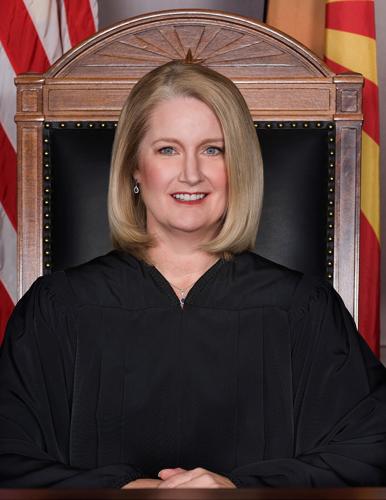PHOENIX — The way Ann Scott Timmer sees it, lawyers are a good thing to have when you have legal issues.
But the chief justice of the Arizona Supreme Court said there aren’t enough of them to go around. And that’s even more true, she told Capitol Media Services, of those who can provide free legal help to those who can’t afford an attorney even if one is available.
So Timmer has signed a new order that will allow people with limited training to legally provide certain advice to clients on consumer issues, debt relief, access to public benefits and landlord-tenant disputes.
The Legal Services Authorized Community Justice Worker program is designed to have these be people already embedded in their local communities who are likely to come into contact with people with unmet legal needs.
It starts, she said, with the fact that getting regular legal help is expensive.
“I don’t blame the lawyers,’’ Timmer said. “It’s expensive to get the education, the overhead, all of these things.’’
That presents a problem.
“So if you are trying to find someone to help you, ironically, with things like consumer debt, landlord-tenant, those types of things, you don’t have a lot of money to spare in the first place, much less to be able to hire an attorney.’’
There are three “legal service corporations’’ in Arizona, funded largely by the federal government: Community Legal Services, Southern Arizona Legal Aid, and DNA-People’s Legal Services.
The people working at these organizations are lawyers, providing free legal help to those whose income is not more than 125% of the federal poverty level.

Supreme Court Chief Justice Ann Scott Timmer has signed a new order that will allow people with limited training to legally provide certain advice to clients on consumer issues, debt relief, access to public benefits and landlord-tenant disputes.
For 2025, the cutoff will be $18,825 for an individual; for a family of four, the figure is $39,000.
The problem, said Timmer, is not just that there are only a limited number of attorneys who are working for these legal services.
What’s also true, she said, is that their offices are located only in certain communities even though, among the three, they’re supposed to serve the entire state. So that person, particularly in a rural community, who has one of those debt or landlord problems, finds “there really isn’t anybody there to help you in answering those questions.’’
That’s where the new program comes in.
As crafted, the three legal services organizations would be authorized to find, train — and deploy — these people who can provide basic legal advice and information.
“It could be a social worker, it could be a librarian, really anyone that sees this population of people that otherwise qualify for legal aid,’’ Timmer said. She said they can provide on-the-ground help “because they’re there interacting with those populations.’’
And Timmer said if these community justice workers can’t answer a specific question — or the person needs actual legal help in court — they can refer the case to an attorney supervising them at one of the legal services organizations.
Still, while these volunteers will get trained by the legal organizations that supervise them, they more than likely will not be working in the same office as a licensed attorney but out on their own. And they need be only high school graduates or have a GED.
Timmer called that a “calculated risk,’’ saying the possibility of someone getting incorrect advice has to be balanced against “the risk of not getting any help.’’
Consider, she said, a tenant having an issue with a landlord over something like unpaid rent.
Put simply, Timmer said, there are not a lot of legal defenses for failure to pay rent. And by the time it gets before a judge, she said, it’s pretty much too late to change the outcome.
“But if you can get someone early on to give them that kind of advice and help on ‘here’s something that can be done,’ maybe this will save people from these kinds of evictions,’’ the chief justice said.
“The cost of having no advice, no help, nothing until somebody serves you process to evict you, putting that on the scales versus getting some advice from somebody that’s been trained by Legal Aid, that has a line into Legal Aid (to seek advice from an attorney), that’s the balance,’’ she said. “And, on balance, it favors authorizing these people in a very limited fashion to provide this kind of thing.’’
If nothing else, the chief justice said it is in the interests of the legal aid organizations that will be using these new community justice workers to ensure they are competent — and not going beyond what they are supposed to be doing.
“It’s on them, and on their insurance, too, if there’s a mistake made,’’ she said. “So they have a vested interest in making sure that the people they’re permitting to do this kind of work are qualified to do it.’’
Anyway, Timmer said, it’s not like Arizona is crafting something from scratch. She said the Supreme Court here studied a similar system in Alaska.
“It’s been a true success,’’ Timmer said. “They haven’t had this kind of problem that you’re speculating could occur.’’
What the court is creating is designed to fill a particular gap in available legal services.
She said these new community justice workers will be a step above paralegals.
Those are individuals who have some training in things like legal writing and research. They, in turn, work for attorneys, helping prepare legal briefs and other chores.
But they cannot work on their own to provide legal advice.
The community justice workers also are a step above document preparers.
“They’re not authorized to provide advice,’’ Timmer said. “But they can help people fill out forms and tell them, ‘This is what they’re asking for.’ ‘’
The Supreme Court also allows for “licensed paraprofessionals.’’
“Those folks can practice law with no supervision by a lawyer,’’ she said. With more ability to practice than community justice workers, they also are subject to the same ethics rules and disciplinary system as full-fledged attorneys.
Still, they’re not full-fledged lawyers.
“They are licensed only in very discrete areas,’’ she said.
One of those are family law and divorce cases in superior court. They also can handle civil lawsuits of less than $12,000, misdemeanor criminal cases if there’s no risk of jail time, and representing people in front of certain agencies.
All these various strata the Arizona Supreme Court has — and is — creating in the legal services industry, said Timmer, is no different than what happened decades ago in the medical profession.
“It used to be, remember, when a doctor had to take your blood or that kind of thing,’’ she said.
“Now we have phlebotomists and we have physicians’ assistants and nurse practitioners — and I think a real recognition that you don’t always need a gold standard, which I view as the lawyer, on every little legal problem,’’ the chief justice said.
Of course, Timmer acknowledged, sometimes it’s not the justices taking the lead in expanding access to legal services. Sometimes, she noted, change is thrust on the legal profession — and on the court itself.
In 1961 the high court concluded it was illegal for title insurance companies to prepare deed, mortgages and contracts in connection with the sale of real estate. The justices later expanded that to say real estate brokers could not prepare purchase agreement.
But all that was overturned in 1962 when voters by a nearly 3-1 margin approved an initiative crafted by the Arizona Association of Realtors that spelled out that brokers can handle everything from purchase agreements to deeds, mortgages, leases, assignments, releases and bills of sale.






